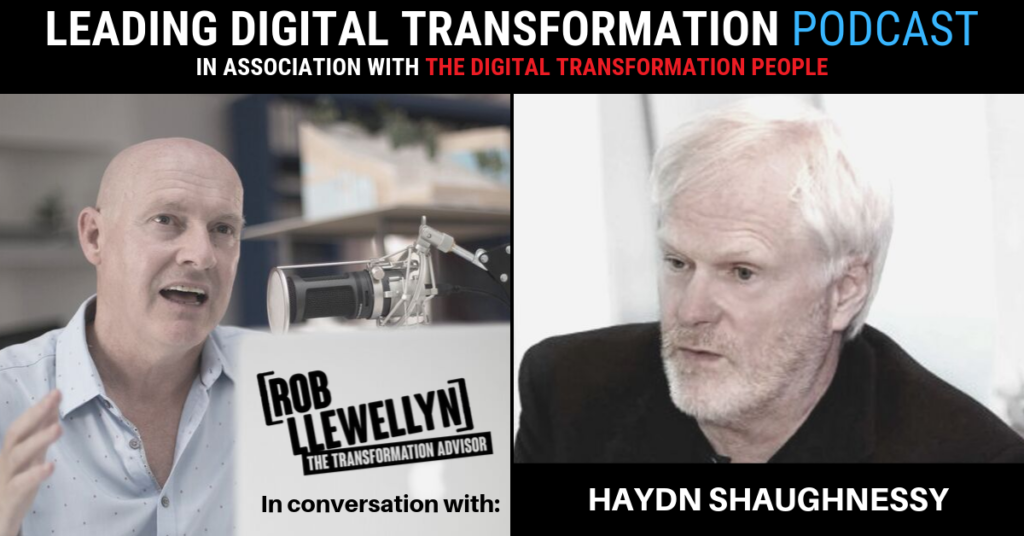‘Leading Digital Transformation’ is a weekly podcast series produced in collaboration between The Digital Transformation People and Rob Llewellyn digital transformation advisor and founder of CXO Transform.
During this series, Rob interviews experienced practitioners, authors and thought leaders whose stories and experiences provide valuable insights for digital transformation success.

In this episode, Rob speaks with Haydn Shaughnessy, Number 1 in the Thinkers 360 list for Digital Transformation and Digital Disruption and a pioneer of platform and eco-system strategy. A regular contributor to Forbes and author of several books, his book “Shift” is a leader’s guide to the platform and ecosystem economy and was described by Forbes as “everything you need to know about digital transformation.” In addition to this, and along with his partner Fin Goulding, he has developed a method for assessing value and directing innovation effectively as part of what they call the Flow Framework. Now as Founder of the Flow Academy, Haydn works with organisations especially interested in creating platforms to troubleshoot and design transformations to give them the best chance of success.
“We have the conditions for platform and eco-system businesses out there, but we need to have the right mindset and the right mindset is to think in terms of exponential scale. Once you start to think in terms of the right scale, you need to narrow your focus down to very small range products or even a mono-focal point at the early stages and grow from that.
Ultimately you need to have the broadest possible range of products and services. Ignore core competency and think about the range of adjacencies you can build in your business. Forget about your domestic markets and think about this global market and the kind of scale that you can reach. Forget about margin, go to near-zero margins scaled over four or five million people. Those are the types of mindset changes I think that senior leaders need.”
Listen here and read the full transcript below.
Transcript
Rob Llewellyn [00:00:21] Hi and welcome to another episode. Number One in the “Thinkers 360” list for digital transformation and digital disruption is Haydn Shaughnessy. And he pioneers new ways to practice business agility. Haydn is a founder of Flow Academy, where his role is to help companies sort out problematic transformations or design them with a strong chance of success. As well as being featured by HBR and Forbes and a published author of no fewer than four books, together with his partner Fin Goulding, Haydn has developed methods for assessing value and directing innovation more effectively. His book, “Shift“, is a leader’s guide to the platform and eco-system economy and was described by Forbes as “everything you need to know about digital transformation”. His clients include the likes of Swift, Fuji Film, the Swiss Stock Exchange, J.P. Morgan and many others. Let’s hear what Haydn has to say about platforms, eco-systems and the challenge of transformation.
Rob Llewellyn [00:01:34] Haydn, welcome.
Haydn Shaughnessy [00:01:34] Thank you. Good to be here.
Rob Llewellyn [00:01:37] Haydn, let’s talk about transformations failing and succeeding. Do you think that the fact that consultants scaring clients by saying that if they don’t do this or that their transformations will fail is a really fair comment for them to make?
Haydn Shaughnessy [00:01:56] I think that consultants are often responsible for the failure. I think that in the past consultants have had a really important role. So if you take something like AI, its actually quite difficult for an organisation to take AI on board, the skills aren’t there. Consultants can go and do three or four AI projects learning along the way and can become very proficient at that. I think the problem with transformations is that there’s no model to apply and there’s no model to generate that you can apply as a consultancy, you’ve got to be [inaudible] situation very much in the circumstances that the company faces. So it’s very difficult to do the kind of division of labour type thing where a consultancy becomes an expert in a transformation. So my sense is, I’m talking to the companies that are hiring, especially the Big Four, that the Big Four try to create a model. They try to apply it. They often fail and they are part of the story of why transformations fail.
Rob Llewellyn [00:02:54] So okay, we’ve focused in on the big consultants and the role that they might play in transformation failure. What can organisations do themselves to increase their chances of success and to avoid the typical pitfalls that we’re seeing?
Haydn Shaughnessy [00:03:11] Well, I think that a lot of transformations, in the end, come down to how free can teams be to co-create the new conditions of work, and very often what happens inside an organisation is that there’s very little focus on the communication. So we talk about things like culture or divisions between I.T. and business, the business of trying to impose requirements on I.T., because of course, most companies rely on software for their products these days. So I think we have this situation where there’s a need for a massive amount of communication that doesn’t really happen because we focus on the problem rather than on how we communicate about the problem. In the work that I’ve been doing, we very much focus on social interaction. So we try to say, “good decisions in work stem from good social interaction”. Most organisations limit social interaction to things like meetings. Meetings are the kiss of death, of course. So we try to create visualisations of work processes and we try to encourage people to have these visualisations readily available on the walls of the building so that people can actually have conversations about what they’re doing. And believe it or not, that’s actually very, very powerful.
Rob Llewellyn [00:04:05] Haydn, you talk about ‘new market dynamics’. Can you explain what you mean by that?
Haydn Shaughnessy [00:04:30] I think there are a number of new dynamics in the marketplace that are forcing companies to not just transform but to create new organisational forms. And we see those new organisational forms in the platform and eco-system movement. I think now for about well perhaps in the App Store, Apple App Store 2008, companies have become increasingly aware that they need some kind of platform. I think that idea is a bit oversold because it’s not that difficult to create a platform. What’s more difficult is to create this eco-system of participants in your economic activity and that eco-system, the idea of the eco-system and eco-system thinking, is very, very underdeveloped. But it is extremely important and it’s at the root of the new market dynamics that I think companies are facing. They’re also facing though things like those eco-systems or eco-system ways of doing business have been harnessed very quickly by Chinese companies. So, if you look at a company like Alibaba, it’s eco-system is vast. Its own companies – companies it actually owns – span things like the Amazon-type product platform to sell goods to people, logistics on a global scale, payments on a global scale, insurance, medical technology, cloud services, cloud platform, even football teams, retail shops, the connected car, those types of very modern ideas about automated cities, smart cities. So here’s one company, the company and its owner, that has an eco-system that spans most areas of economic activity. In the West, that would be called “antitrust” or it would be called a cartel. It would be seen as very dangerous. In China, it’s not seen that way. But I think what the lesson is in there is that unless you start to think about an eco-system, unless you challenge your ideas about core competency, the limitations that we impose on ourselves in the West, then we’re going to lose out to these massive Chinese eco-systems. So, that’s another aspect of the new market dynamics. And I think that the final part is these Asian companies address markets of billions. So, if you’re Chinese you’ve got 1.4 billion, but if you look around at Chinese influence in Asia and Africa, you’re looking at a market around about 2030/2040 of somewhere in the region of five to six billion people. So, the kind of scale benefits that Asian companies are going to get from that are creating new market dynamics over here and will create a huge amount of price pressure.
Rob Llewellyn [00:07:08] That’s really interesting what you said about the Chinese markets and platforms. So, I guess what we’ve got here, correct me if I’m wrong, we’ve got this terrific model, this platform model (which any country and industry could take advantage of), but am I right in saying that because of policies and laws, countries other than the likes of China are not able to take full advantage of platforms?
Haydn Shaughnessy [00:07:33] I think that’s going to be the case. I would emphasise the eco-system more than the platform because the eco-system is really the organisational form which breaks some of the rules that we impose on ourselves in the West. I think yes, ultimately unless we address antitrust issues unless we start to look again at how cartels perform and find ways in which we can allow companies to grow in scale, then we’re in trouble economically. Of course, when you start to get these kinds of companies, when you start to get cartels as right now [there’s] a platform summit in Germany, Platform Europe, it’s called Platform Summit Europe, the history of Germany is to some extent before 1945, the history of the kind of damage that cartels can do, so we’re straying into quite significant political and economic risk with the way platforms and ecosystems are evolving. We’ll have to address it.
Rob Llewellyn [00:08:26] A lot of different people are talking about platforms in different ways at the moment. Do you think platform transformation is being talked about enough and in the right ways?
Haydn Shaughnessy [00:08:35] I don’t think it’s talked about in the right ways. I think that where people talk about platforms at the moment, they tend to think in terms of two-sided markets, like Airbnb and Uber or dating sites and the pricing mechanisms that attract people into platform activity. But I think that’s actually quite a narrow academic concern. What’s really happening out there is that the platform is a technology, so platform is things like a transaction engine. So, if you look at the great innovations in the early part of the web, Google ad search and AdWords, a transaction engine that can manage many millions of very small transactions sometimes done around 25 to 50 cents. If you look at Amazon right now, the big innovation in Amazon marketing is being able to advertise your books on Amazon platforms. It’s kind of crazy in a way, but again you’re bidding something like 30/40 cents for having your book advert receive a click. And it’s extraordinary the way it’s paradoxical, something in this very highly-scaled world that we live in relies very much on micro consumption, and in this particular case the micropayment transactions. So, I think that that’s what the platform is and the platform actually allows you to do these things that we were never able to do before because the cost was too high. So it’s a great cost reduction device if you like. I think that the real economic energy lies in the eco-system and a lot of companies think that they can plan an eco-system. I’ll give you an example of an eco-system that’s totally unplanned but is nonetheless interesting. I think that the Amazon book platform has many elements to it that Amazon does not control and can’t control. So Amazon has a very poor search engine and one of the things that happens on Amazon is that entrepreneurs go find books that are buried away in the Amazon search engine. They then buy those books maybe for 20 cents or a dollar, then create a new product page for that book and then resell it at 20/30/40 dollars. And that’s actually external entrepreneurs managing the long tail. Of course, Amazon depends on the long tail products that somebody out there somewhere wants. So actually what you see in that particular instance is an eco-system activity. People who have no relationship with Amazon going on buying then reselling books at 10 times the value. Actually creating value, because once they do the new product page, people can find that book much more easily. So effectively they’re paying 18/19 dollars for easier searchability. But the interesting part about it is that that company has no real relationship with Amazon. And if you look at the Airbnb ecosystem, you see something similar that most of the activity in the AirBnB eco-system is not controlled by Airbnb. So, access control service providers, conferences or cleaning companies or tenancy management software have nothing to do with Airbnb, but they’ve proliferated around AirBnB. I think the lesson is for many of the managers out there, you can create your platform but there’s something quite different in the way ecosystems evolve around those platforms. Having the platform strategy is only one half of it, not even half of it. Having the sensibilities to help eco-system to grow around you is a totally different and totally new management skill.
Rob Llewellyn [00:12:05] So, how do you relate ecosystems to new ways to work?
Haydn Shaughnessy [00:12:11] I think it’s this extreme flexibility that you need. We tend to call that flexibility “agile” or “agility”. So first of all on a managerial scale leaving aside our job for a moment on the managerial side of things, you have to have a way of creating economic activity and nurturing economic activity that does not directly reward you. And if you look at what the CEO at Tencent says it’s absolutely that. What he looks to do with his strategy is to promote the good of the eco-system, invest in the benefit of the eco-system going to everybody within it. So, the pure profit driver that we’ve been used to now for a couple of hundred years doesn’t work with eco-systems very well. And you have to start rethinking how you invest in a kind of indirect benefit to your business. So I think that’s a whole host of things that senior management need to think about and they don’t think about it, it’s very difficult for them to contemplate it. But in another sense, in execution terms, what you see with these platform eco-system businesses is that there’s a huge amount of innovation and Amazon is obviously a great example of that. But I think they’re all the same. Now you can manage a lot of that innovation. You might assume you can manage a lot of innovation internally because Apple seems to do a lot of that. But if you look at Apple’s work around the Apple Watch, the health industry, Apple sits at the centre of a very wide range of companies who are doing analytics around what does it mean when you capture certain patterns in the heartbeat. How do you best define heart rate variability? What value does an ECG taken by a watch really have? And so a lot of people in the medical field I think are starting to gravitate towards the data that the watch creates. But Apple can’t control any of that, it has to interact with it. And I think that’s again even a kind of control freak company like Apple has to accept that when it gets into some of these situations with its products, it’s relating to the people around it, not managing them.
Rob Llewellyn [00:14:23] I guess this is a massive mindset shift that leaders need to take, if they’re to take full advantage of the kind of eco-systems you’ve just been talking about, correct? You just gave a really good example of Tencent, about their CEO wanting to provide value. That’s a big mindset shift, isn’t it, Haydn?
Haydn Shaughnessy [00:14:41] I think it is a big mindset change. I think actually Tim Cook at Apple isn’t too bad at making that change and Tencent and Alibaba of course lead in this area. If you look at what Alibaba did in 2016, I think it might be 2017 but 2016/2017, they trained 1 million young Chinese people in the countryside in how to set up and run a business. There’s a clear advantage to Alibaba if a million new businesses are set up in rural Ireland because they’re going to sell through the Alibaba platform, but leave that aside or compare it to the role that Alibaba is taking on there. It’s actually taking on an economic development role and Tencent similarly takes on economic development role. I don’t think we quite grasp the responsibility for things like economic policy is gravitating towards these platforms and eco-systems. And in China where you have a strong state-controlled mechanism, you’re probably better off adopting that economic development role sooner rather than later, and actually showing how well it can work, showing how important you are to the economy. I think we are avoiding that in the West at the moment, I think it’s part of the whole transformation journey that we need to go on, which is to say “OK, well between 2013 and 2016, it was estimated that Apple created something like three and a half million new jobs in Europe through the apps platform and probably 5 million in the United States, well let’s grab hold of that. Let’s start to work with that, because basically a lot of the responsibility for job creation passed to the private sector at that point, and then the private sector succeeded in a way that government simply can’t succeed.” So, we need to work with that rather than ignore it.
Rob Llewellyn [00:16:34] We’ve talked about some of the superstars in this digital economy, such as Amazon, Tencent, Alibaba, etc.. But we’ve got a lot of organisations out there wanting to get on this journey of transformation that you just referred to. Let’s focus on how do they begin these transformations, Haydn, when a lot of them have no experience of transformation. They’ve been ticking over operationally for many years. How do they begin a transformation?
Haydn Shaughnessy [00:17:01] So, I think there are different dimensions to it, aren’t there? We hear about digital transformation a lot. So how do you start to digitize some of your workflow that’s probably paper-based at the moment? And even that’s problematic for a company. Then there is this other transformation where you’re trying to transform to something that’s more central to how a market operates. And I think that you see that happening or you see the conditions for that to happen in different industries. It varies of course, but if you look at something like the transport industry, we are now thinking about mobility, rather than the train or the bus or the car. So there is something that is happening in transport that will lend itself to a platform and eco-system play and is lending itself. If you look at the whole electrification of business, so going from pure carbon to electrically-powered business, I mean in the sense that you might have a mind that converts from its equipment being run on diesel to being run on electricity. So there is this other part of the economy, it’s quite closely related to transport, which is all about electrification. The players that are in that market would tend to be the players that have been in the traditional transport industry. So you’d get people like BP and Shell. You’d get some of the car manufacturers and you’d get a generation of new players that have electricity-saving devices or energy-saving devices. So I think that very often what you’re faced with are the conditions to do platform and eco-system place. And I think that those conditions are quite extensive. If you look at the medical field, you’ll probably see something similar. You see it in banking. The banks want to relate more closely to FinTechs. They have difficulties in doing that and it’s not clear that the FinTech industry is the right eco-system for them or that their strategies are right. But first of all, I want to say that the conditions are there for doing business differently. The mindset change comes I think (to a certain extent) from scale, so say I’m a bank and I’m looking at my conditions, the conditions of finance and payments and the delivery of goods, because I think there’s a case for saying that anybody who’s financing things should also be in logistics. So if I’m a bank and I’m looking at the market out there, incidentally Barclays Bank CEO was at the M.I.T. platform summit about a month ago and declared that Barclays is a platform. The problem with that claim and also with how banks think is it really what you need is to have, say, four or five hundred million customers. That’s the name of the game. As Barclays, you might have 20 million. You might not even have that many. And the first problem I think they hit against is that they just don’t think in terms of the right scale. They also [inaudible] the complexity of the product range and service range that they have, whereas in fact what they need to do is simplify that down and go to a kind of mono-product mindset because online and globally you can sell single-focussed products very easily, whereas you can’t sell complexity at all. So, if I was at Barclays right now I’d be saying “how do I see the road to 300 million customers, 400 million customers by say 2030, actually by 2025. So you’d be looking at say what product can I focus in on that’s going to give me access to 2, 3, 400 million people? And what kind of pricing policy do I adopt that means that I’ll get that kind of uptake and I can compete against an hourly pay or the Asian payment mechanisms that have come to market?” So I think it’s a bit about that. I think it’s also in electrification, you might be saying something similar like “okay, how do I provide the solution for charging in high-density urban areas? I’m certainly not going to be able to do it on my own. What does it mean to be a charging company when half of the world’s car fleet is switched over to electricity?” You’ve got to start thinking that that’s probably going to affect the lives of hundreds of millions of people. So again it’s about “how do I operate? How do I do that at scale?”. And most companies will start off by saying “how do I do that at high margins?” And I think that’s the wrong approach. “How do you it at scale at very low margin, but very low margin over 4, 500 million customers?” So, my answer is, first of all, you have the conditions for platform and eco-system businesses out there, but you need to have the right mindset and the right mindset is this kind of exponential scale. And I think once you start to think in terms of the right scale, you need to narrow your focus down to very small range products or even a mono-focal point at the early stages and grow from that. And from there, adopt the kind of mindset that you see becoming more and more common, which is actually I don’t focus on a core range of products. Ultimately I have the broadest possible range of products and services. But of course, you’ve got to take time to get there. So there are a number of new things are happening, ignore core competency. Think about the range of adjacencies you can build in your business. Forget about your domestic markets and think about this global market and the kind of scale that you can reach. Forget about margin, go to near zero margins scaled over four or five million people. Those are the types of mindset changes I think that senior leaders need.
Rob Llewellyn [00:22:29] Haydn, you talk about end-to-end flow [in your book]. What do you mean by that?
Haydn Shaughnessy [00:22:33] So I probably didn’t answer fully the question you asked earlier, which is “why do you need new ways to work?” And I think you need new ways to work, because you’re going to break a lot rules. We have to see companies breaking the rules of business that they’ve grown up with and that their managers been educated in and that applies to people that are doing delivery work. So basically what we need are people who are able to generate small businesses within a large business and to generate a lot of these over time. So we don’t want people that are going to follow a prescription for what they need to do. We need people that are going to be much more creative and much more entrepreneurial in its outcomes. And once you start to do that, I think you have the opportunity to say “actually most businesses right now stall a lot of creativity and progress, because they have reporting lines”. So, work begins, a report goes up, it gets signed off, permission to continue comes down or doesn’t come down, and people sit around for a long time. Actually, if you move to a kind of higher-type model where you think of your business as being thousands of micro-businesses, then you start to eliminate those reporting lines and you eliminate this really tedious drag on people who are always having to seek permission for the next move that they make. People can go end-to-end so they can start with an idea, a team can work with that all the way to delivery and as far as acquiring the customer feedback in order to improve the product or improve the service or improve the processes that create the product and service.
Rob Llewellyn [00:24:10] Haydn, we’re going to have to wrap it up there. But before we do that, where can listeners go to learn more about the concepts you’ve been talking to us about today, new market dynamics, eco-systems etc.?
Haydn Shaughnessy [00:24:23] Well, there is a book called “Flow – A handbook for Changemakers”, which is available on Amazon. It’s a good starting point. There is the Flow Academy website, Flow-Academy.org. Both are good places to start to think about these types of things. And there’s another book called “12 steps to Flow“, which is more of a practical guide on how to start doing end-to-end flow.
Rob Llewellyn [00:24:46] Excellent. We’ll put links to those in the show notes. Haydn, thank you so much for your time today.
Haydn Shaughnessy [00:24:51] Thanks. It’s been a pleasure.
Announcer [00:24:53] We hope you enjoyed this episode of “Leading Digital Transformation” with Rob Llewellyn and The Digital Transformation People. Visit www.thedigitaltransformationpeople.com to secure the knowledge, talent and services you need for digital transformation success. To continue your journey as a certified transformation professional, visit www.RobLlewellyn.com. Be sure to subscribe to the podcast and follow us on Twitter @TheDigitalTP and @RobertLlewellyn
Article by channel:
Everything you need to know about Digital Transformation
The best articles, news and events direct to your inbox
Read more articles tagged: Featured, Platforms and Ecosystems, Strategy






